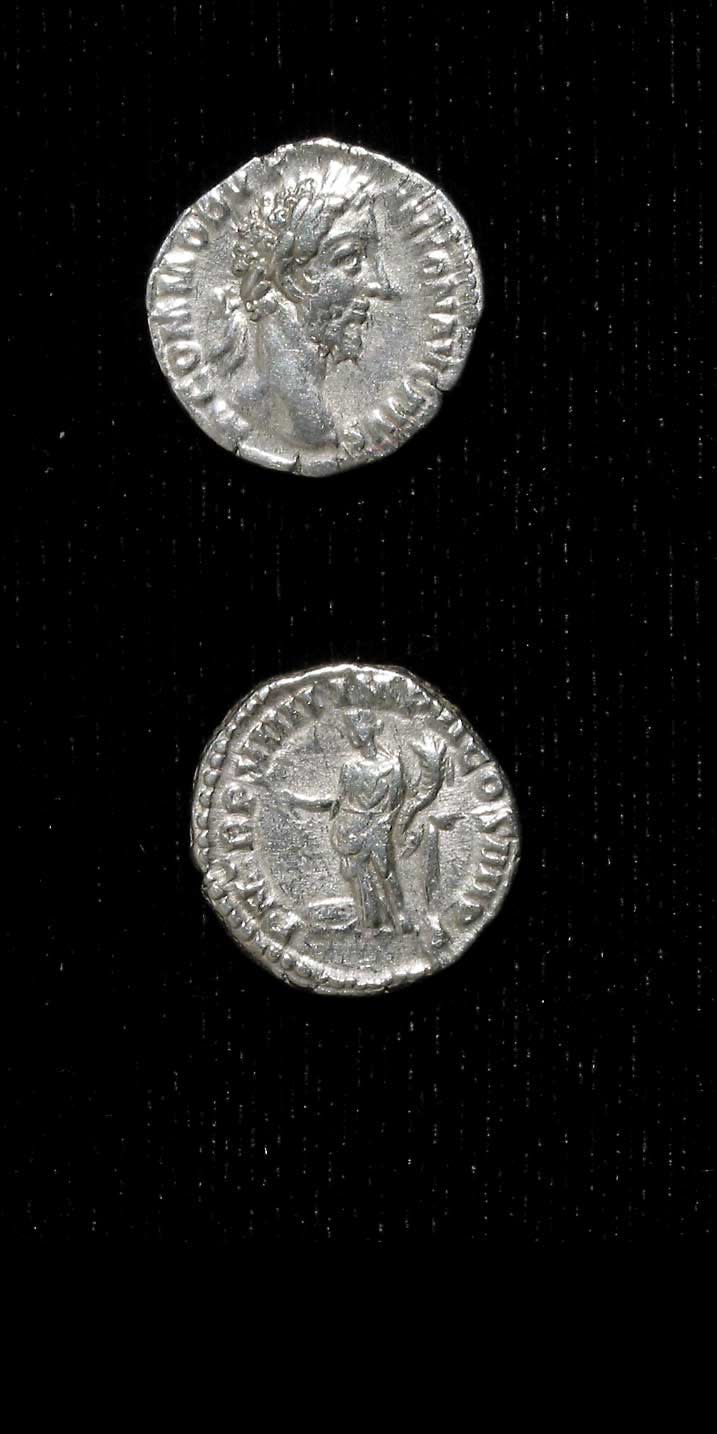Silver Denarius of Emperor Commodus, 180 CE - 192 CE
Silver
C.8711
Further images
Obverse: M COMMODVS ANTON AVG PIVS; Laureate Bust of the Emperor Facing Right Reverse: PM TR P VIIII IMP VI COS IIII PP; Felicitas Standing to the Left, Holding a...
Obverse: M COMMODVS ANTON AVG PIVS; Laureate Bust of the Emperor Facing Right
Reverse: PM TR P VIIII IMP VI COS IIII PP; Felicitas Standing to the Left, Holding a Caduceus and a Cornucopiae, a Prow by her Feet on the Lef
Lucius Aelius Aurelius Commodus was born on August 31, 161 A.D. to the Emperor Marcus Aurelius and Faustina Junior. Of their thirteen children, he was the only boy to survive early childhood, thus making him the logical heir to the throne. He was appointed as Caesar at the age of five and was officially presented to the army at the age of twelve in 173 A.D. Two years later, young Commodus was named Princeps Ivventis and coopted in the college of priests. Next, he accompanied his father on a victorious military campaign against the Germans and the Sarmatians. In 177 A.D., the title of Augustus was bestowed upon him and he was lofted to the position of co-ruler alongside his father. That same year, he was married to Crispina, the daughter of one of the dutiful generals on the Sarmatian campaign. The next year, Commodus embarked upon another German campaign that ended with a favorable peace shortly after his father’s death in 180 A.D. Soon afterward, a Senatorial plot was uncovered and suppressed in 182 A.D. Implicated in the conspiracy were both his wife Crispina and his sister Lucilla, both of whom would be exiled to Capri. Ten years later, on December 31, 192 A.D., Commodus was murdered.
How many hands have touched a coin in your pocket or purse? What eras and lands have the coin traversed on its journey into our possession? As we reach into our pockets to pull out some change, we rarely hesitate to think of who might have touched the coin before us, or where the coin will venture to after it leaves our hands. More than money, coins are a symbol of the state that struck them, of a specific time and location, whether contemporary currencies or artifacts of a long forgotten empire. This stunning hand-struck coin reveals an expertise of craftsmanship and intricate sculptural detail that is often lacking in contemporary machine-made currencies. This coin is a memorial to an ancient Emperor passed from the hands of civilization to civilization, from generation to generation that still appears as vibrant today as the day it was struck.
Reverse: PM TR P VIIII IMP VI COS IIII PP; Felicitas Standing to the Left, Holding a Caduceus and a Cornucopiae, a Prow by her Feet on the Lef
Lucius Aelius Aurelius Commodus was born on August 31, 161 A.D. to the Emperor Marcus Aurelius and Faustina Junior. Of their thirteen children, he was the only boy to survive early childhood, thus making him the logical heir to the throne. He was appointed as Caesar at the age of five and was officially presented to the army at the age of twelve in 173 A.D. Two years later, young Commodus was named Princeps Ivventis and coopted in the college of priests. Next, he accompanied his father on a victorious military campaign against the Germans and the Sarmatians. In 177 A.D., the title of Augustus was bestowed upon him and he was lofted to the position of co-ruler alongside his father. That same year, he was married to Crispina, the daughter of one of the dutiful generals on the Sarmatian campaign. The next year, Commodus embarked upon another German campaign that ended with a favorable peace shortly after his father’s death in 180 A.D. Soon afterward, a Senatorial plot was uncovered and suppressed in 182 A.D. Implicated in the conspiracy were both his wife Crispina and his sister Lucilla, both of whom would be exiled to Capri. Ten years later, on December 31, 192 A.D., Commodus was murdered.
How many hands have touched a coin in your pocket or purse? What eras and lands have the coin traversed on its journey into our possession? As we reach into our pockets to pull out some change, we rarely hesitate to think of who might have touched the coin before us, or where the coin will venture to after it leaves our hands. More than money, coins are a symbol of the state that struck them, of a specific time and location, whether contemporary currencies or artifacts of a long forgotten empire. This stunning hand-struck coin reveals an expertise of craftsmanship and intricate sculptural detail that is often lacking in contemporary machine-made currencies. This coin is a memorial to an ancient Emperor passed from the hands of civilization to civilization, from generation to generation that still appears as vibrant today as the day it was struck.





